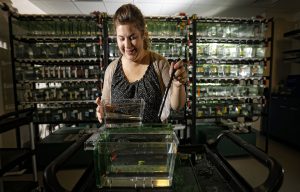 What does a young woman from a small town in Kentucky fixing watches and toasters have to do with potentially life-saving cancer research? That’s how Jessica Blackburn, Ph.D. a researcher at the University of Kentucky, first fell in love with science. She always wanted to know more about how things worked. After a molecular biology class in college made her realize that the cells in the body are just little machines, the path became clear.
What does a young woman from a small town in Kentucky fixing watches and toasters have to do with potentially life-saving cancer research? That’s how Jessica Blackburn, Ph.D. a researcher at the University of Kentucky, first fell in love with science. She always wanted to know more about how things worked. After a molecular biology class in college made her realize that the cells in the body are just little machines, the path became clear.
“I would always attend seminars after classes and the cancer talks always got my imagination the most fired up,” said Blackburn. “It made me realize that cancers are just broken cells that need fixed. I’ve focused on cancer research ever since.”
But starting a career in cancer research is not easy. It can take a large amount of data to secure government grants, and getting that data takes time and money. Blackburn had a good idea, but not much data yet to support it. Blackburn got her big break with a V Scholar Grant from the V Foundation, funded by the Louisville Friends of V.
“The funding from the V Foundation allowed me to start the project and key data showed my idea would work. I was then able to use this data to obtain a $1.5 million grant from the National Institutes of Health in support of this project,” said Blackburn. “Reviewers at the NIH specifically pointed out the V Foundation grant as an indicator that I was on the right track. Having the V Foundation support me and think that I was worth investing in as I was just starting my lab and my independent research career was a big confidence boost. I will never forget how that felt.”
Blackburn’s research focuses on acute lymphoblastic leukemia, which is a common (and deadly) childhood cancer. While available treatments are good at knocking the cancer back, specialized cells called leukemia stem cells can pose a problem. If just one of these cells survives through treatment, the cancer can regrow. Blackburn hopes to find new ways to identify and kill these leukemia stem cells to ensure the cancer does not return.
“No one knows much about leukemia stem cells. They are rare, and once they are taken out of the body, they lose some of their unique and important properties, such as their ability to self-renew and reform a tumor,” said Blackburn. “It’s been very difficult for scientists to study these cells using traditional methods.”

So, just like when she was busy ruining her mom’s electronics as a kid, Blackburn had to think outside the box. The solution? Zebrafish. When zebrafish are engineered to develop a blood cancer, they produce a high amount of leukemia stem cells. Conveniently, they are also great model animals for screening potential new drugs, because they absorb chemicals through their skin. By dosing the fish’s water, researchers can quickly find out whether the drug has potential to treat blood cancer without leaving leukemia stem cells behind.
“We are one of the few labs in the world that has a strain of zebrafish where we can transplant leukemia cells from one animal to another, so we can use special techniques to study leukemia stem cell self-renewal,” said Blackburn. “We are able to use zebrafish to help define why leukemia stem cells self-renew and why they are more drug resistant. I am excited that these new insights can help answer important questions in cancer biology while at the same time possibly provide new and safer treatments for patients.”
From watches and toasters to leukemia stem cells, Blackburn has come a long way. She is now leading the charge toward new treatments for acute lymphoblastic leukemia. This is why your support matters. Funding V Scholars leads to new, innovative ideas that push us closer to Victory Over Cancer®.




